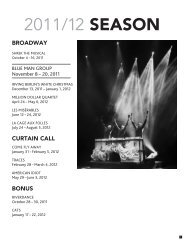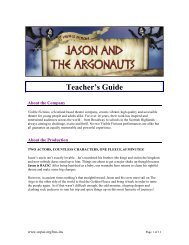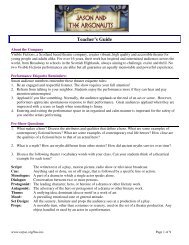SPRING AWAKENING - Segerstrom Center for the Arts
SPRING AWAKENING - Segerstrom Center for the Arts
SPRING AWAKENING - Segerstrom Center for the Arts
You also want an ePaper? Increase the reach of your titles
YUMPU automatically turns print PDFs into web optimized ePapers that Google loves.
Today <strong>the</strong>re’s plenty of advice <strong>for</strong> parents,<br />
teachers and o<strong>the</strong>r adults on how to help<br />
teens cope with this difficult period of<br />
development. Certainly more than <strong>the</strong>re<br />
was in <strong>the</strong> 1800s. Websites like Teenwire<br />
help teens understand <strong>the</strong>ir sexuality and<br />
o<strong>the</strong>r problems facing <strong>the</strong>m. But does<br />
understanding translate into coping?<br />
Does <strong>the</strong> advice that “it’s just a phase and<br />
everything will be fine in <strong>the</strong> end if you just<br />
stick it out” make it any easier? Afterall,<br />
<strong>the</strong>y’re still battling hormones, lack of<br />
peer acceptance, depression, academic<br />
pressure. Unless families can af<strong>for</strong>d long<br />
term <strong>the</strong>rapy, teens are on <strong>the</strong>ir own—<br />
fledgling adults in a world which keeps<br />
insisting, “In <strong>the</strong> end, it will all be okay.”<br />
While feelings of <strong>the</strong>ir own sexuality are<br />
not going away, and social, academic and<br />
adult pressure will be <strong>the</strong>re no matter<br />
what, all we can really do is help <strong>the</strong>m<br />
cope. Life doesn’t come with an owner’s<br />
manual. We have to figure it out <strong>for</strong><br />
ourselves. When it comes to growing up<br />
adults don’t have all <strong>the</strong> answers. Some<br />
who think <strong>the</strong>y do quickly discover <strong>the</strong>y<br />
are not always <strong>the</strong> ones teens want to<br />
hear. Without options, teens may become<br />
disillusioned and make bad choices, like<br />
Wendla and Moritz and Melchior and even<br />
Wendla’s mo<strong>the</strong>r, who chose a dangerous<br />
abortion procedure ra<strong>the</strong>r than bear <strong>the</strong><br />
shame of her daughter’s pregnancy.<br />
As teachers <strong>the</strong>re are several things we<br />
can do to. Involve students in group<br />
activities that are not stressful; try to<br />
eliminate teasing and belittling and any<br />
behavior that may humiliate <strong>the</strong> student;<br />
encourage and praise doing well on<br />
assignments; promote leadership roles;<br />
encourage contributions to community<br />
and world activities that are meaningful<br />
and noteworthy; respect <strong>the</strong>ir needs <strong>for</strong><br />
physical, creative and expressive outlets.<br />
And most important, listen. If you’re really<br />
worried, ask. Teens see things a lot more<br />
clearly than you might think.<br />
23
















